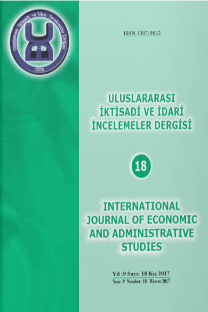OECD ÜLKELERİNİN SAĞLIK ETKİNLİKLERİNİN VERİ ZARFLAMA VE TERS VERİ ZARFLAMA ANALİZLERİ İLE DEĞERLENDİRİLMESİ
Bu çalışmada 2018 yılı için Türkiye’nin de içinde bulunduğu Ekonomik Kalkınma ve İşbirliği Örgütü (OECD) ülkelerinin sağlık alanındaki etkinliklerinin girdi yönlü DEA ve ters DEA modelleri ile değerlendirilmesi amaçlanmıştır. Girdi ve çıktı değişkenleri literatürdeki çalışmalar incelenerek belirlenmiştir. Buna göre girdi değişkenleri bin kişi başına düşen hekim sayısı, bin kişi başına düşen hastane yatağı sayısı, kişi başına düşen sağlık harcaması, çıktı değişkenleri ise doğumda beklenen yaşam süresi ve hayatta kalan bebek oranıdır. DEA sonuçlarına göre sadece Türkiye, Meksika ve Kolombiya etkin bulunmuştur. Ayrıca ülkelerin sağlık etkinlik puanlarını en fazla etkileyen girdi değişkeni doktor sayısı olarak belirlenmiştir. Elde edilen ters DEA bulgularına göre ise doğumda yaşam beklentisi ve bebek hayatta kalma oranı değerlerinin örneklemdeki en iyi değerlere yükseltilmesi için Türkiye’nin mevcut doktor sayısının yeterli olduğu, kişi başı sağlık harcamasının ve hastane yatak sayısının ise arttırılması gerektiği ortaya koyulmuştur.
Anahtar Kelimeler:
VERİ ZARFLAMA ANALİZİ, TERS VERİ ZARFLAMA ANALİZİ, KAYNAK TAHSİSİ
EVALUATION OF HEALTH EFFICIENCY OF OECD COUNTRIES WITH DATA ENVELOPMENT AND INVERSE DATA ENVELOPMENT ANALYSES
In the present study, the purpose was to evaluate the health effectiveness of the Organization for Economic Development and Co-operation (OECD) countries, including Turkey, with input-oriented DEA and inverse DEA models. The input and output variables were determined by examining the studies in the literature. In this respect, the input variables were identified as the number of physicians per thousand people, the num-ber of hospital beds per thousand people, health expenditure per capita; and output variables were ex-pected life expectancy at birth, and rate of surviving infants. According to the DEA results, only Turkey, Mex-ico and Colombia were found to be efficient. In addition, the input variable which affects at most the health efficiency scores of countries was determined as the number of physicians. According to the findings of the inverse DEA obtained in the study, it was determined that the current number of physicians in Turkey was sufficient, and that the healthcare expenditure per person and the number of hospital beds should be in-creased.
___
- Afonso, A. and Aubyn, M. (2006). Relative efficiency of he¬alth provision: a DEA approach with non-discretionary inputs. Working Papers No:33, file:///C:/Users/Lenovo/ Downlo-ads/SSRN-id952629.pdf, Erişim Tarihi: 15.05.2020.
- Afonso, A and Aubyn, M. (2007). Assessing Health Efficiency Accross Countries with Two-Step and Bootstrap Analysis. Paper presented at the conference “Fiscal Policy Challenges in Europe”, 1-33.
- Ahmed, S., Hasan, M.Z., MacLennan, M., Dorin, F., Ahmed, M.W., Hasan M.M., Hasan, S.M., Is-lam, M.T., Khan, J.A.M. (2018). Measuring the efficiency of health systems in Asia: a data envelopment analysis, https://bmjopen.bmj.com/content/bmjopen/9/3/e022155.full.pdf, Erişim Tarihi: 10.06.2020.
- ISSN: 1307-9832
- Yayın Aralığı: Yılda 4 Sayı
- Başlangıç: 2008
- Yayıncı: Kenan ÇELİK
Sayıdaki Diğer Makaleler
İNDİRİM MARKETLERİNİ KİMLER, NEDEN TERCİH EDER?
Aykut YILMAZ, Ömer Sezai AYKAÇ, Kürşad ÖZKAYNAR, Tarık YOLCU
ULUSLARARASI TİCARET VE LOJİSTİK ARASINDAKİ İLİŞKİNİN İNCELENMESİ: G20 ÜLKELERİ ÖRNEĞİ
Yasemin KORKUT, Sema YAVUZ, Feyyaz ZEREN
BALASSA-SAMUELSON HİPOTEZİ: FARKLI GELİR GRUPLARI ÜZERİNE BİR PANEL VERİ ANALİZİ
Duygu Yolcu KARADAM, Büşra GEDİKOĞLU
Saharnaz DAMİROVA, NİHAL YAYLA
DÜZENLEYİCİ ODAKLARIN DEĞİŞİME DİRENÇ ÜZERİNDEKİ ETKİSİNDE ÖRGÜTSEL İLETİŞİMİN ARACI ROLÜ
